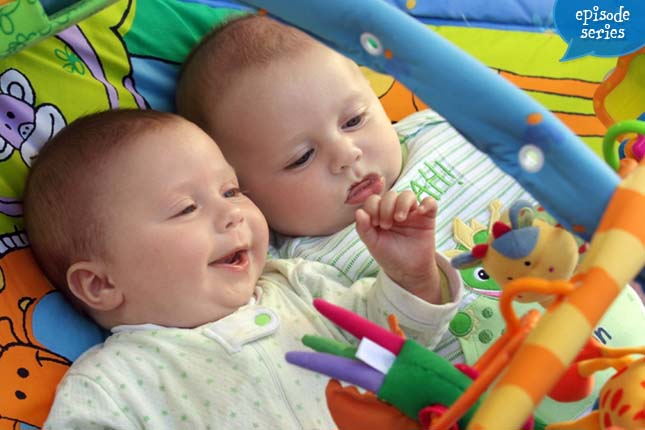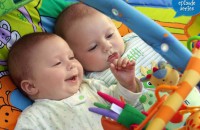Twin Talks
TWIN DEVELOPMENTAL MILESTONES: SPEECH AND LANGUAGE
[00:00:00]
Please be advised, this transcription was performed from a company independent of New Mommy Media, LLC. As such, translation was required which may alter the accuracy of the transcription.
[Theme Music]
CHRISTINE STEWART-FITZGERALD: Are you concerned about your twin’s language development? Well, today we’re with Sara Toogood who is a Speech and Language Pathologist and we’re here to talk about: “Twin Developmental Milestone, Speech and Language.” This is Twin Talks Episode 13.
[Theme Music/Intro]
CHRISTINE STEWART-FITZGERALD: If you’re pregnant with twins or you’re an experienced twin parent, odds are you have heard it all before. Now, it’s time to hear from the experts. This is Twin Talks, parenting times two.
Welcome to Twin Talks broadcasting from the Birth Education Centre of San Diego. Twin Talks is your weekly online on-the-go support group for expecting and new parents to twins. So, I’m your host Christine Stewart-Fitzgerald.
Have you heard about the Twin Talks Club? Our members get bonus content for each new show plus special giveaways and discounts. You can subscribe to our monthly Twin Talks Newsletter and learn about the latest episodes available.
Another way for you to stay connected is by downloading our free Twin Talks app. It’s available both on the iTunes and the Android Marketplace. Before we jump in, we’re just going to do a quick round of introductions here. So, I’ll start with myself here.
I’ve got a set of four year old identical girl twins and I also have a singleton as well who’s one year old. It’s interesting because my four year olds; recently, we’ve noticed that they’ve had some difficulties in articulating words, some consonant blends. So, we actually just started doing some speech therapy to help them in articulation.
Then, my youngest singleton who’s 15 months – she’s I guess considered a little bit delayed. She’s not speaking words. She’s still kind of doing the babbling. So, our paediatrician just recommended that we get her screened as well. So, I’ve to say: “This is definitely a topic close to home.” So, I’m going to throw this over to Shelly here.
SHELLY STEELY: Hi. I’m Shelly, I’m the producer here at Twin Talks and I’m also a high school history teacher. I have 18 month old twin boys who are just kind of starting to discover words. It’s a fun age because every day is something new and different.
We’ve noticed that: “They seem to be pretty much on track but I’m always a little bit concerned when I hear about these 18 months old with 100 word vocabularies – videos of them, singing the national anthem.”
SUNNY GAULT: I’m Sunny. I have baby girls – baby girl twins. I was trying to think if they’re infants. I guess they’re at the infant stage is that 2 ½ months is that considered an infant?
CHRISTINE STEWART-FITZGERALD: They are an infant, yes.
SUNNY GAULT: So, infant twin girls, identical. I’m just looking for them to like coo or babble or something. As far as talking’s concerned, I have a lot of talking already going on my house because I’ve got two older boys. I’ve got a 3 year old boy and a 21 month old boy.
I will say: “My three year old is in speech classes.” He had delayed speeches. He is a very smart kid. I know like every parent says that. But, he is. He is very smart. He can do a lot of like really difficult puzzles and figure things out. But, socially; he’s a little – I don’t know what it is. He’s a little off. I have to admit and to go along with that is the speech.
We’re on a point now where he definitely talks more than my 21 month old but at the same time; my 21 month old was a lot further along at 21 months than my 3 year old was. I think part of that is too and I’m sure we’ll talk about this a little bit is that: “Siblings, they learn better from one another usually than other people like adults and stuff like that.” That they seem to pick up on language a little bit better.
So, I have my ear to the ground when it comes to the girls because I’ve already kind of experienced this. Every Thursday and Friday we’re taking our 3 year old to Speech Class. So, I’m already and I myself – I should say: “When I started kindergarten, they made me do speech.” So, it runs in the family. So, yes this is the topic close to my heart as well.
CHRISTINE STEWART-FITZGERALD: Interesting!
[Theme Music]
CHRISTINE STEWART-FITZGERALD: Well, before we jump in and talk about that. We wanted to go to some headlines in the news. I’m going to turn this over to Shelly.
SHELLY STEELY: Yes. So, here at Twin Talks we’re always kind of keeping an ear out for twins in the media. The most interesting story we’ve encountered recently was you might have heard about: “The New Year’s Twins who are born in separate years.”
So, it actually looks like there were two different mothers who gave birth to two of the last babies of 2013 and 2 of the first babies of 2014. So, born just minutes apart – we have twin babies who were actually born in different years.
So, December 31st 2013 at 11:58 PM a baby girl and then just soon after it, 12:01 AM on January 1st 2014, a baby boy – the father said: “It was wonderful and joyful. He’s just happy and delighted.” But, speaking as a twin mom myself, I just kept thinking: “What about their taxes?” You only get to claim one kid.
CHRISTINE STEWART-FITZGERALD: Yes and I think, I can imagine just all the forms you must fill out and then you got two different birthdays and then you have to explain. No, really
SUNNY GAULT: That’s what I’m thinking.
SHELLY STEELY: Every single time.
SUNNY GAULT: The explanation because they’re going to have their whole life. You’re not a twin; you were born on different year; seriously because I don’t know if that many people are going to look that closely at the month.
SHELLY STEELY: What about cut off dates for sports? Aren’t those January 1st for some?
CHRISTINE STEWART-FITZGERALD: Right. My gosh. I wouldn’t even think of that.
SUNNY GAULT: Can the doctor kind of fudge that a little bit. Mom I’d be like: “No, still in 2013.”
SHELLY STEELY: My aunties who are twins were allegedly born on separate days but they actually had the doctor kind of just do a little bit fudging on the time there to give them the same birthday on the birth certificate. So, I wonder how common that is.
CHRISTINE STEWART-FITZGERALD: Yes, that would be interesting. I’m just thinking: “There’s got to be an upside because: “Okay, most twins in having the same birthday, they’re sharing everything including the whole birthday celebration, birthday party.”
SUNNY GAULT: So, now it’s a day off.
CHRISTINE STEWART-FITZGERALD: So, they get different birthdays. Does that mean that the parents get to have two different birthday parties?
SHELLY STEELY: Are they throwing two parties?
SUNNY GAULT: Yes, I actually read that. I read that online. One of those couples that Shelly was talking about: “One of the couples is going to have different days for their birthdays.” Is it really going to be that different?
It’s kind of like: “If your birthday is near Christmas, it’s messed up no matter what.” Whether you celebrate on a 24th or 25th it doesn’t matter, right? It’s in the same thing here. It’s kind of messed up.
CHRISTINE STEWART-FITZGERALD: Yes, I don’t know. But, they’re not sharing something. So, maybe that’s
SHELLY STEELY: It makes exciting news but I’m glad it wasn’t mine
SUNNY GAULT: And me too.
CHRISTINE STEWART-FITZGERALD: I think it’s probably better for the twins and the pain in the butt for the parents.
SUNNY GAULT: Yes. All the logistics around it, right?
[Theme Music]
CHRISTINE STEWART-FITZGERALD: Today’s topic is: “Twin Developmental Milestones of Speech and Language.” So, we’re talking with Sara Toogood and she’s here to help us identify and address important milestones for speech and language. So, thanks for joining us Sara.
SARA TOOGOOD: Yes, absolutely. It’s great. I could hear that I’m speaking with a bunch of really fun and informed parents.
CHRISTINE STEWART-FITZGERALD: Well, thank you. We wonder when it comes to twins versus singletons; do you see in your practice that – I mean are twins more susceptible to speech problems compared to singletons?
SARA TOOGOOD: This is a really good question and it does come up a lot. I think the root answer comes from what else twins are susceptible too. In terms of their other medical susceptibilities, these twins are more likely have premature birth. They’re likely having a lot of the other medical problems and some feeding with it.
From being born with not as completely developed brain, these things could happen – later along the developmental trajectories too. So, we often see twins come in with some sort of come to the hospital with some sort of medical problem like a co-occurring speech to lay in other development abilities as well.
CHRISTINE STEWART-FITZGERALD: It sounds like as you see that early on or is that – do you see problems with; let’s just say babies or compared to preschoolers, is there a difference in sort of when the parents can identify that there might be an issue with speech?
SARA TOOGOOD: The true answer is: “This can be identified with any age or stage along the spectrum of development.” I think that you may have some sort of sense of later and higher level of development. Some are looking at the earlier and more basic development.
So, kids in terms of their motor skills for example, they developed Gross Motor before they developed Fine Motor speech as in motor skills like you see some of the Gross motor delays. They’re not sucking. They’re not latching. They’re not moving their mouth and tongues the same way. That’s a very, very basic stage.
You can have them that this Gross Motor delay as the speech mechanism is trying to define its fine modes of movement. They’re maybe delayed there.
CHRISTINE STEWART-FITZGERALD: I never thought of speeches being a motor skill. So, I’ve always thought of it as being as sort of as being the kind of cognitive skill. Can you give us an example of maybe something that parents might seeing – that doesn’t seem like that’s right.
SARA TOOGOOD: Sure. First, I kind of wanted to define terms the way a speech talks about them. Other speech therapist uses their words might be a little bit different. So, speech refers to the production of the sounds, right?
Language refers to the combinatorial ability that your brain has to put words together into ideas and sentences. So, when we call ourselves Speech Language Pathologist, we’re looking at the farthest of the speech mechanism – the motor skill and the language production ability. So, the cognitive part of it as well.
But, I just want to say those words out there before we got any further. But, you said – there’s something that we can look for really early on. I think parents are very in tuned with what their kids want; so they’re really good anticipators.
They see the glimmer in the kids’ eye and that specific glimmer means hungry and that specific glimmer means tired. I think if parents take a step back from their natural tendency to just assume and give a couple of seconds of late time – they’ll be able to see like a little potential in there. What would this kid do to communicate?
I like to use communicating part of speech more language because it’s both of them. What would this kid do to communicate if I didn’t meet their needs immediately? From there, you might kind of have a sense: “They didn’t try any harm. They got really frustrated or they try to gesture. They’ve tried a babble.”
I think parents – it’s going to be really hard to find out a sign unless you take a step back and watch your kid without your help.
CHRISTINE STEWART-FITZGERALD: So, in your terms so speech is really more about the production of the sounds forming and then the language is really talking about: “How are they understanding. It’s a cognitive side. How are they understanding and communicating the ideas behind it.”
SARA TOOGOOD: Yes. Language has those two components. You’ve exactly define them and I’ll just give you the words that we use – Receptive for what you can understand and Expressive for what you can communicate outwardly.
CHRISTINE STEWART-FITZGERALD: Okay. Now, we’re just wondering when it comes to twin, well twins and singletons – do you see any major differences between boys and girls in terms of individual development of speech and language?
SARA TOOGOOD: Well, I hate to say it but yes. It doesn’t last long. This is not going to be for the rest of their lives. But, they are certain things that kind of show up earlier for females than males in terms of language development and it’s really because of their nature as social beings.
A language – so, communication, let’s use the broadest term there. Of course, there’s a motor component and that’s speech. Of course as a cognitive component and that’s language and the way we combine these words to understand them and to produce something that someone else can understand.
But, a huge part of it is social – communications develop out of social necessity to understand and be understood. So, because of the way that young females and young males interact differently in their social needs, the language comes out differently. I mean we can be super generalist about it and talk about how boys are very physical and active and how girls are a little more meticulous and analytical and that’s where it comes from.
You know, it’s bigger than that. It’s more than that. But, if that helps you to understand and explain why females are a little earlier for some of these language milestones and as a fine way to understand it.
CHRISTINE STEWART-FITZGERALD: No, it’s great. I guess it sounds for Sunny – for you then, you might have a completely different experience with your girls than your boys.
SUNNY GAULT: I’m hoping. But, really and really it’s just my older son like I’ve said: “The second one seems to be picking up on a lot more.” But, do you see that Sara with the siblings; do you see like the second born or whatever picking up stuff more from an older child?
SARA TOOGOOD: I actually do see it go either way. There’s no family structure that’s going to be exactly the same to the next. But there are two kinds of classes of problems that happen here that come to me. One is like: “You’re saying that the younger one is just picks up so fast and then the parents start to worry about the older one.” What’s happening here?
Well, what’s happening is: “Like you guys said in your introduction – kids learn so much from their siblings. They’re sponged and they’re just picking it up from their peer communicators.” We communicate like our peers and siblings are their peers. So, that’s one end.
Fear not parents, the older kids are okay. Just one is: “We have an older sibling – a 4 year old girl and then we have a younger sibling; our 18 month old boy and my 18 month old boy is not getting the same milestone.” Well, hey there’s the boy-girl factor we just talked about.
B) I love to help her and bring out that can’t get a word in X - Y syndrome. If you are highly verbal parents, if you have the highly verbal older child; what time throughout the day did you want your kid have to communicate?
So, this takes back to my point. Step back, give the kid space and time, try to [inaudible] and you may have to work with your older child on that like giving them a quiet activities. Good luck.
CHRISTINE STEWART-FITZGERALD: That’s kind of an interesting thought – say, rather than the parents doing all the talking but really giving the kid opportunities to talk.
SARA TOOGOOD: Exactly. Yes, I’m going to say some buzz words to you guys that are my favourite buzz words to say to parents – opportunity not pressure. So, you can give the kid an opportunity not pressure to be that awesome baseball pitcher. You need to give a kid an opportunity but not pressure to speak and communicate when they’re very young.
There’s a really trick where you can easily do this but many parents just do them naturally. The first one is: “Wake time.” Say something model, show them what you want them to do to communicate and then hold yourself back for 3 to 5 seconds.
Another way is through: “Anticipation.” So, if I say: “Ready, set – the anticipation is that you fill in that gap with the word go.” Or if I say, A, B, C, D, E, F – you have something in you that really wants to say G.
So, build on what these kids know and how they can anticipate what comes next and then stop yourself and let’s see if they use that anticipation to fill in and to seize that opportunity to speak.
CHRISTINE STEWART-FITZGERALD: Anticipation. So, it sound like so many times using songs and poems and some of these rhyming things for kids.
SARA TOOGOOD: It fills on the anticipation.
CHRISTINE STEWART-FITZGERALD: So, it becomes familiar and they just jumped right on it.
SHELLY STEELY: I know with my boys they love the: “Head and shoulders knees and toes song.” They can’t say shoulders or knees or point to them but they get really excited and they’ll often look at me and they’ll point at their head and said: “head.”
They’ll kind of watch if I wait and then they’ll – if I don’t fill it in, they’ll point to their own toes and say: “Toes.” They’ll do it again to see if I’ll kind of like follow along with them. So, you can kind of watch them like trying to connect it together. They know that it goes.
Now, I can see them do it. They’ll do it with their dolls. They’ll point to the dolls head and the dolls tell us what our dog do.
CHRISTINE STEWART-FITZGERALD: That’s cute. That’s very cute.
SARA TOOGOOD: There are a lot of toes on that.
SHELLY STEELY: Yes.
SARA TOOGOOD: It’s going to be a long game, isn’t it?
CHRISTINE STEWART-FITZGERALD: No, I just want to know – we kind of talked about sort of the idea of we have these developmental milestones. What they do is should kids be doing certain things. We should be looking for.
SARA TOOGOOD: Good question. Unfortunately, this is the way paediatrician’s think. They think ages for a Speech or language therapist, I think stages. So, first I’m going to not answer your question. But, don’t worry. I will. So, I like to think in stages.
If my kid do this, well then what would the next thing be and how can I get them there. If we lock ourselves into ages – we just become these anxious parents and kids feed off your anxiety and wanted to know: “What’s going on? Why is mommy so worry they think my X found or whatever it is.”
So, think about where – [inaudible] a proximal developmentally psych people out there. What is the next step and how can I scuffle this kid or pull myself back to give them the opportunity to get to that next step?”
So, always thinking about: “What’s next not: “My gosh. I’ll be needing up where they need to be.” So, now let me give you some just very basic milestones to keep in your head. I’m terrible at math. So, these are really easy for you. One is one, two is two, and three is three. Okay, if you’re using single words at each one; you’re pretty much all right.
If you’re doing combined two-word phrases at age two; it’s pretty much all right. If you’re getting to three words phrases at age three, you’re pretty much all right. Same thing for – so that will be expressive language; how they are communicating upwardly; now, let’s go to Receptive. Guess what?
One is one, two is two, and three is three. If they’re following one step direction at each one, you’re great. If they’re following two steps direction of age two, you’re great. If they’re following three step directions, they’re ready to participate in preschool because that’s what we expected kids in preschool.
Now, if you want more details – give me a call, come to the hospital; we’ll get more picky. That’s kind of like a general place to think about. Now, let’s talk about how well your kid can be understood. There’s a word out there called “intelligibility.” Don’t think this has anything to do with intelligence because it has only has a couple of letters and common. It’s not the same.
Intelligibility is how well you are understood. So, if a kid is 50% intelligible to me, I can understand 50% of what they’re trying to say through their babbles and what not. So, here’s a rule: “It’s not a one or one, two is two.” So, I’m going to go one level higher with you guys here.
CHRISTINE STEWART-FITZGERALD: Okay, we’re ready.
SARA TOOGOOD: Are you ready? It’s divided by four. So, a two year old divide by four it’s going to give you a percent; 50%. So a two year old that I just met today, I should be able to understand about 50% about what they’re trying to tell me.
A three year old that I just met today, 3 over 4 it might need to take for this 75%. I should be able to understand 75% intelligible to a new list of occurrence not mom. Mom should be a 100 plus %. Then, they always are.
Believe me, so if you want milestones for receptive expressive language and speech intelligibility – it’s when we start to be really strong at one and kind of lagging in the other; that’s what we get concerned.
So, when they’re skilled aren’t commensurate, there’s another word. If you want to get to Speech and Language Services for your kid, if one set of skills is not commensurate with another, we get concerned about this like scattered development. So, that’s when we might want to push in one area.
CHRISTINE STEWART-FITZGERALD: Earlier, you kind of mentioned that sometimes kids might have some physical limitations specially I mean if maybe they are premature, another age adjusted and they were maybe some issues, delivery who knows. What are some of the common physical limitations that might slow down the speech development of toddlers?
SARA TOOGOOD: So, I want to go back to Gross Motor to Fine Motor idea. If you are a developing very young human, the Gross Motor things that you develop first are: “Being able to hold your head up, the trunk stability. Those kinds of very proximal so like in a centre of your body, a very Gross Motor like big movement kinds of things.
Think about where your speech – now, we’re talking about sound production. Think about where that comes from. It comes from a controlled breath and a controlled exhale. If you don’t have trunk stability, you’re going to have really weak airflow and you won’t have the breath support for speech.
Not saying you’re going to notice a kid speaking in a really breathy way; but just a way to think about how it really is a whole body working together and a whole system to create speech production. Once we have a good growth trunk stability, we can work on that – in case with that air that’s coming up there and make very fine motor movements.
A Fine Motor movements are your tongue and your lip. If you’ve ever watched yourself talk like I find myself in a mirror right now, it is a coordinated, perfectly timed, intricate Fine Motor task. Much like –now if you think about Fine Motor the first thing you think of is fingertip task; your tongue and your lips are way more difficult than that.
So, think about – if you start this kid is screened and they say something to you like: “Maybe you should seek occupational therapy or early in preventive physical therapy or tongue stability and transfers each movement transitions.” Then, okay think about this: “If I don’t develop my Gross Motor very well, the Fine Motor that needs to go on top of that, it maybe the way things go.”
So, that’s speech production movement. Now, language development – how can we, what signs early on motor lies will be predictive of language like the thinking and of our communication. If the kid is not super aware of their environment, if they don’t respond to their environment, they will have no intent to communicate with it.
So, watching how your kid might be aware of toys that move. Are they interested in toys that move more than toys that are just sitting there? So, awareness of the environment talks us to want to interact with our environment and when kids interact with their environment, the next thing they want to do is control it. You are parents and you know that I’m right.
CHRISTINE STEWART-FITZGERALD: Yes.
SARA TOOGOOD: The way we control our environment is mainly with our hands, we go and turn the light off or we also control it with our language: “Mom light off.” You see, it’s all cause and effect.
So, if you see your kids’ awareness of the environment willingness and desire to interact with the environment; the next thing will be their willingness, desire and they need to control the environment. When we have that, that’s going to be their root desire to have a language.
CHRISTINE STEWART-FITZGERALD: There’s also I know a mouth dysfunctions too. We’re going to take a break and when we come back we’re going to talk about: “Common dysfunctions that kids have.” Welcome back. Today, we’re talking about: “Twin Developmental Milestone – Speech and Language” with Sara Toogood.
SUNNY GAULT: Sara, I actually had a question. I was wondering if you could touch on lip-ties and tongue-ties really briefly. My twin girls, they were born at 35 weeks via caesarean. So, a little bit on the preemie side.
My lactation consultant originally said that: “They had a slight tongue-tie which we’ve been able to do some different exercises to kind of remedy that a little bit. But, now I got advice from somebody else that they think that they both have a lip-tie. I was like: “Okay, what is that mean?” How does that impact stuff?
Someone had told me – someone told some sort of medical background and tell me that: “If that does go unfixed either of those, it could resolve in some delayed speech.” Is that true? Have you seen that?
SARA TOOGOOD: It’s a big topic to clip or not to clip. I’m not [inaudible 00:24:35] who does the clipping so I don’t make the recommendations. But let’s talk about it a little bit because if there are some broad things to know.
The first thing is: “If someone is talking about a range of motion of your what we call “Articulators in speech therapy but with like tongue and lips.” It’s the range of motion – it’s going to be enough for them to have clear speech. We also talked about the strength of your tongue. If the kid has a weak tongue, it’s not going to be stronger to make clear speech.
Here are something to remember: “Using 10% of your oral motor strength to speak – if you’re weakness is so delayed you’ve got a 10% that’s good enough to be able to speak clearly.” So, don’t think that a little bit of weakness is necessarily going to impair a speech production and intelligible speech.
Now, about the ties; a tongue tie is you open there and list and it could be your tongue up. That lingual fraenulum, it’s an important piece of skin there. It holds your tongue to the bottom of your mouth and it helps with control and balance and what not. If it impairs your baby’s feeding if it is too short or restrictive that it impairs your baby’s feeding – that is a reason to have a medical intervention.
If it’s not impairing the feeding then it’s probably going to be okay just like other parts of our body. It can grow. It can become a little more flexible. So, if breathing is first, teething is next, speaking is way down the line.
So, if some anatomical or physiological thing is impairing your breathing or your feeding – that’s no good. The lip-ties, if you pull your bottom lip down or your top lip up you also have a fraenulum there. It kind of does the same thing.
It keeps stands in place for balance and coordinative movements and you don’t want to. You want things to move in a normal coordinative way. If it’s impairing seeding, that’s when it needs to be medically addressed.
CHRISTINE STEWART-FITZGERALD: For any type of speech and language disorder, if there has been some form of diagnosis is made – we’ve heard about doing early interventions. I mean what exactly is an early intervention and how does that make a difference?
SARA TOOGOOD: When a delay – I’m talking globally. So, speech, language, motor fine motor, whatever – when a delay is identified early, not only is the duration of the kid’s therapy is going to be shorter than it will found later and the severity of their future delays will be less.
So, one thing that I can put into your mind is that: “Early language development is predictive not puzzled but part of the correlation is predictive of later academic achievements.” So, in terms of literacy, early language and speech development has correlation to a kid’s reading and overall academic later in there early elementary and beyond.
CHRISTINE STEWART-FITZGERALD: Interesting. So, another word –if the kids are using language on their own in an expressive way – then basically you’re saying that: “They can have more success later on into the school years with an academic setting?”
SARA TOOGOOD: I’m saying that: “It’s one predictive factor.” There are of course, a multitude of other predictive factors including those social pressures that you have no control.
SHELLY STEELY: I know. We’ve all got anecdotal stories. But, my cousin San, he wasn’t talking at all like to – so no words. Not the two words; sometimes you look for and so she was worried because of her older daughter was full sentences by 18 months and then they wondered if part of it was he couldn’t get a word in edgewise kind of.
They ended up having him evaluated for early intervention and he qualified for a services and he went a 2 1/2, 5 days a week to half days of school. It made a world of difference for him. You wouldn’t even know it was the same kid after just a year in the program.
He’s 7 now, 8 – he’s just turning 8 and he’s other above grade level in everything and it’s like: “This was the kid who had significant language communication delays at a young age.:
SARA TOOGOOD: Another thing to think about to is I only briefly mention the social part of it – this is the age where kids are not cognitively developing those to have these ideas of stigma. This is the age when therapy is play. We wouldn’t be able to get a kid to participate with us if want to play. If it were drilled and if it were annoying and boring, they wouldn’t participate.
So, this is a really good age for social development. This is a really good age for financial reasons. It’s going to be less of an intervention burden further on and currently, I want to say because I know health care stuff is changing day-by-day. If your kid is eligible and qualifies the early intervention by definition are services for a kid under the age of three.
These are provided free of cost and for most situations in the home. Free of cost is because the government has realized that if we address these things for make prevention and an early intervention kind of mindset then it would be less of a financial burden later.
Also, in the home, the reason why that happens it’s not to make it easier to new moms but it really does make it easier – so, get things going. But, this is a natural context where the language would develop.
We have to address the kids’ needs in any environment that they live in because if we bring them to a curricular, white wall closed box room and they use their language really well with one other person – that being a train service and then send them on their way, it’s not going to carry over into those above context. So, there is a free of charge early; in-home therapy is exactly what this age group specifically needs.
CHRISTINE STEWART-FITZGERALD: Absolutely, yes. Definitely, it takes a lot of the parental involvement. So, you know what? We’re going to wrap up the discussion right here for our regular listeners. I just want to say: “Thanks so much Sara for joining us today.”
For more information about: “Twin Developmental Milestone – Speech and Language” or more information about any of our experts or panellists, visit our episode page on our website. Now, this conversation does continue for members of our Twin Talks Club. So, for more information about the Twin Talks Club, visit our website www.TwinTalks.com .
[Theme Music]
CHRISTINE STEWART-FITZGERALD: We’ve got a special segment that we call: “Crazy and annoying questions that we twin parents hear from people.” Today we have one of our panellists who’d like to share her story.
SHELLY STEELY: So, I’m Shelly. I have identical twin boys – Greyson and Sawyer and they’re almost 15 months now. My husband and I can’t go to Costco without getting literally harassed by anyone and everyone. The most memorable one – I remember we have; the boys were about I want to say 7 or 8 months and we have them in the same cart and they’re identical. My husband dresses them the same.
So, we already have a big flashing sign on us. We’re walking down the aisle and this women walks up to my husband and says: “Would you like to just hear a horrible story about twins?” He glares at her and he says: “No.” He keeps walking and she kind of moves up to him and says: “it’s not that horrible. It’s just that I’d really like to tell you.”
He’s pushing faster and he’s kind of giving her a look and moving
CHRISTINE STEWART-FITZGERALD: Stalker.
SHELLY STEELY: He’s stall. So, at this point she’s almost running to came up with us. I really just need to say: “It’s just that my grandmother had three sets of twins so at least you don’t have that bad.” I’m thinking: “What is this woman trying to tell?” At least it’s not that bad, you didn’t have three.
So, you would think that after this exchange that we would have maybe gotten out of there but we turn into the corner in there’s a woman who kind of saw the exchange and she’s one of the women selling the sample, giving the samples out and she looks and says: “Twins. You must get questions all the time. How was your delivery?”
At that point, you just have to laugh and move on. It’s kind of a constant, just personal question or the crazy things that people tell you. You had no idea. For me, I’m outgoing it’s amusing to me but my husband’s kind of more of an introvert and he’s had it’s been an eye-opening to him.
CHRISTINE STEWART-FITZGERALD: So, that wraps up our show for today. We appreciate you listening to Twin Talks. Join in on the discussion by posting your comments on the Twin Talks Facebook Page or by calling our voice mail at 619-866-4775.
Don’t forget to check our sister shows:
• Preggie Pals; it’s for expecting parents
• We have “The Boob Group” for moms who breastfeed their babies
• Parent Savers; it’s an online support group for the new parents.
Next week, we’re going to be talking about: “Speech and Language Development.” This is Twin Talks, parenting times two.
[Disclaimer]
This has been a New Mommy Media production. Information and material contained in this episode are presented for educational purposes only. Statements and opinions expressed in this episode are not necessarily those of New Mommy Media and should not be considered facts. Though information in which areas are related to be accurate, it is not intended to replace or substitute for professional, Medical or advisor care and should not be used for diagnosing or treating health care problem or disease or prescribing any medications. If you have questions or concerns regarding your physical or mental health or the health of your baby, please seek assistance from a qualified health care provider.
SUNNY GAULT: New Mommy Media is expanding our line up of shows for new and expecting parents. If you have an idea for a new series or if you’re a business or organization interested in joining our network of shows through a co-branded podcast, visit www.NewMommyMedia.com .
[00:34:21]
[END OF AUDIO]












